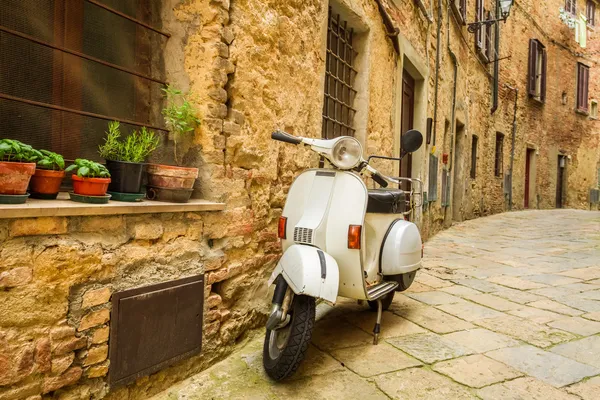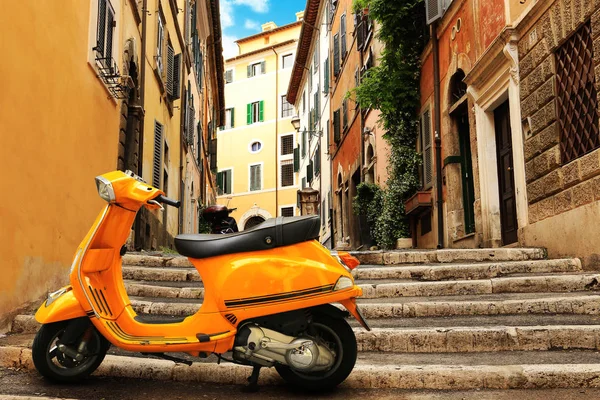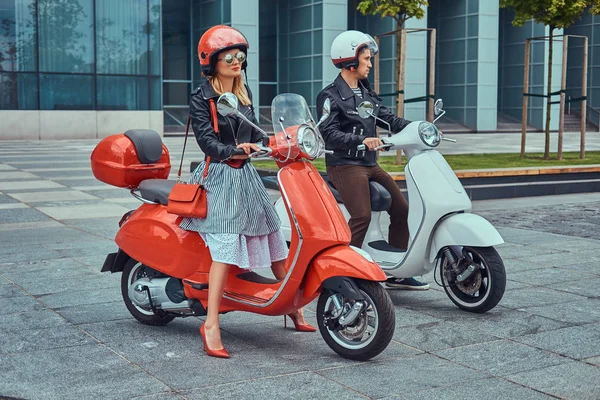Scooter Culture: Exploring the Fascinating World of Scooter Enthusiasts
Scooter culture has been on the rise in recent years, with more and more people adopting scooters as their primary mode of transportation. This trend is particularly popular among millennials who are looking for a more eco-friendly, cost-effective, and fun way to get around.
The rise of scooter culture has also led to the emergence of a new subculture mod culture that is centered around scooters and the lifestyle that comes with them.

Scooter culture is not a new phenomenon, however. It has been around since the 1950s when scooters first became popular in Europe. The mod subculture that emerged in the UK in the 1960s was heavily influenced by scooters, and they became a symbol of youth rebellion and freedom. Today, scooter culture has evolved into something more mainstream, with people of all ages and backgrounds embracing the scooter lifestyle on the street.
Whether you are a seasoned scooter rider or just curious about the phenomenon, there is no denying that scooter culture is here to stay. From the thrill of riding to the sense of community that comes with being part of a subculture, there are many reasons why people are drawn to scooters.
So if you are looking for a new way to get around or just want to learn more about this fascinating subculture, then join me as we explore the world of scooter culture.
History of Scooter Culture
Origins and Evolution

Scooters have a long and interesting history that dates back to the early 19th century. Karl von Drais de Sauerbrun invented the first two-wheeled ride in Germany in 1817. However, it wasn't until the 1940s that scooters became popular as a low-cost alternative to automobiles in war-torn Europe.
Designed as public transport for the masses, scooters quickly caught on and became one of the most iconic symbols of the post-war era.
Over the years, scooters have evolved significantly, with different models and designs catering to different needs and preferences. In the 1960s, scooters became synonymous with the Mod subculture in the UK, with the Vespas and Lambretta being the most popular models. The young Mod - subculture embraced scooters as a symbol of rebellion and freedom, and the scooter became an integral part of their lifestyle.
Influence on Media and Fashion
Scooters have also had a significant influence on media and fashion. In the 1950s and 1960s, movies like "Roman Holiday" and "Quadrophenia" featured scooters prominently, making them even more popular. The Mod subculture also contributed to the popularity of scooters, with their distinctive fashion and music choices, especially during the Mod revival of the 1970s.
Today, scooters continue to be popular, with electric scooters becoming increasingly common in urban areas. They are a convenient and eco-friendly mode of transportation that is easy to use and maintain. Scooter culture has come a long way over the years, and it continues to evolve with changing times and trends.
Modern Scooter Scene

As a scooter enthusiast, I have observed the changes in scooter culture over the years. The modern scooter scene has evolved from its roots in the 1960s and 1980s to include a diverse range of riders, styles, and communities.
Types of Scooters
Scooters come in a variety of styles and sizes, from vintage Vespas to modern electric models. Classic scooters are popular among collectors and enthusiasts, while newer models offer improved speed, performance, and eco-friendliness. Some popular types of scooters include:
-
Classic Vespa scooters and Lambretta models
-
Modern electric scooters
-
Sporty models with larger engines
-
Retro-styled models with modern features
Scooter Modifications
Customizing and modifying scooters is a popular trend among scooter enthusiasts. From adding performance upgrades to aesthetic enhancements, there are countless ways to personalize your ride. Some common scooter modifications include:
-
Upgraded exhaust systems for improved performance
-
Custom paint jobs and decals for a unique look
-
Aftermarket seats and accessories for added comfort and style
-
Engine swaps and upgrades for increased power
Scooter Clubs and Communities
Scooter clubs and communities are a great way to connect with other riders and share your passion for scooters. These groups often organize rides, rallies, and events, and offer a supportive community for scooter enthusiasts. Some popular scooter clubs and communities include:
-
Vespa Club of America
-
Modern Vespa Forum
-
Scooter Club UK
-
Scooterworks USA
In conclusion, the modern scooter scene is a vibrant and diverse community of riders, styles, and cultures. Whether you're a vintage Vespa enthusiast or a modern electric scooter rider, there's a place for you in the world of scooters.
Scooter Culture Worldwide
As a passionate scooter enthusiast, I have come to appreciate the rich and diverse culture that surrounds these two-wheeled machines. From the streets of Italy to the skateparks of California, scooter culture has become a global phenomenon. In this section, I will explore the regional variations and global events that define scooter culture around the world.
Regional Variations
Scooter culture varies greatly depending on the region. In Italy, for example, scooters are an integral part of daily life. They are used for commuting, running errands, and even for leisurely rides through the countryside. Italian scooter enthusiasts take great pride in their machines, often customizing them with unique paint jobs, accessories, and performance upgrades.
In the United States, scooter culture has a slightly different flavor. While scooters are still used for transportation, they have also become popular among the skatepark crowd. Teenagers across the country have embraced scooters as a form of self-expression and street show, using them to perform tricks and stunts that rival those of traditional skateboarders.
Global Events and Rallies
One of the most exciting aspects of scooter culture is the global events and rallies that bring enthusiasts together. These events offer a chance to meet like-minded individuals, show off your brand of scooter, and take part in exciting activities and competitions.
One such event is the International Scooter Association (ISA) World Championship, which is held annually in various locations. This event brings together the best scooter riders from around the globe to compete in a series of different kind of freestyle and park events.
Another popular event is the EuroLambretta Jamboree, which is held every two years in a different European city. This event is a celebration of all things Lambretta, with thousands of enthusiasts from other countries gathering to show off their machines, participate in rides and rallies, and enjoy live music and entertainment.
Scooter culture is a vibrant, fun and exciting community that spans the globe. Whether you're a commuter, a skatepark rider, or a die-hard enthusiast, there is a place for you in the world of scooters.
Challenges and Future
Safety and Regulations

As electric scooters become more popular, safety concerns have arisen. Riders need to be aware of their surroundings and follow traffic laws, but it's also important for cities to establish regulations for scooter use, especially in the case of this 'new breed' of transportation. This includes setting speed limits, requiring helmets, and designating where scooters can be ridden and parked.
Cities have also implemented safety measures such as adding bike lanes and creating designated parking zones for scooters. Companies that provide scooter rentals have also taken steps to improve safety by requiring riders to take safety courses before renting and providing helmets.
Sustainability and Innovation
Electric scooters are often touted as a sustainable mode of transportation, but their environmental impact is not without controversy. The production and disposal of the batteries used in electric scooters can have negative environmental effects. Additionally, the short lifespan of the scooters themselves can lead to a large amount of waste.
However, there are efforts being made to improve the sustainability of electric scooters. Companies are working on developing more efficient batteries and exploring alternative materials for scooter production. Additionally, some cities have implemented regulations requiring companies to dispose of old scooters responsibly.
In terms of innovation, the electric scooter industry is constantly evolving. New features such as GPS tracking and anti-theft technology are being added to scooters, and companies are exploring new business models such as subscription services and partnerships with public transit systems. As the industry continues to grow, it will be interesting to see what new innovations emerge.
Frequently Asked Questions
What attire defines scooter culture fashion?
Scooter culture fashion is characterized by a distinct combination of vintage and modern styles. The classic mod look, which originated in the 1960s, is still popular motor scooters around today and includes slim-fitting suits, button-down shirts, and parka jackets.
Additionally, scooter riders often wear leather jackets, jeans, and boots. Helmets are also a common accessory in scooter culture, with many riders opting for retro-style helmets that not only provide safety but also add a cool vintage touch to the aesthetic of their scooters.
How did the scooter boy subculture originate?
The scooter boy subculture emerged in the 1970s as a response to the declining popularity of the mod subculture. Scooter boys were known for their love of scooters, music, and fashion. They often wore parka jackets, jeans, and boots, and listened to ska and reggae music.
The scooter boy subculture was particularly popular in the UK, where it was associated with working-class youth culture, and it was considered 'cool' by many.
What are the defining characteristics of the mod subculture associated with scooters?
The mod subculture emerged in the UK in the late 1950s and early 1960s and was characterized by its love of fashion, music, and scooters. Mods were known for their sharp suits, button-down shirts, and parka jackets. They listened to soul, jazz, and R&B and were often associated with the Vespa and Lambretta scooter brands.
What influences mod fashion for females within the scooter scene?
Mod fashion for females within the scooter scene is heavily influenced by 1960s fashion. Women often wear A-line dresses, mini skirts, and tailored jackets. Accessories such as scarves, sunglasses, and berets are also popular. Many female scooter riders also wear retro-style helmets that match the vintage aesthetic of their scooters.
What factors have contributed to the resurgence of scooter popularity?
The resurgence of scooter popularity can be attributed to several factors. One of the main factors is the growing interest in vintage and retro styles. Additionally, scooters are seen as a more environmentally friendly and affordable alternative to cars.
The ease of parking and maneuvering in urban environments also makes scooters an attractive option for city dwellers.
How does scooter culture differ at universities compared to urban environments?
Scooter culture at universities is often characterized by a sense of community and camaraderie among scooter enthusiasts, and the sense of community plays a big part in it. Many universities have scooter clubs that organize riding events and rides. In urban environments, scooter culture is often more diverse and varied, with riders from different backgrounds and subcultures coming together to share their love of scooters.
